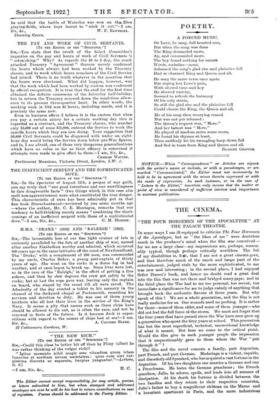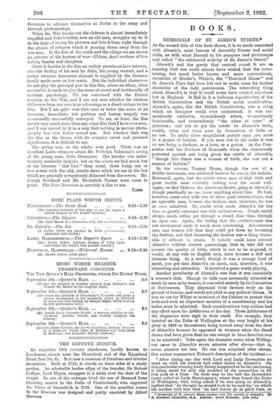THE CINEMA.
" Tlii i FOUR HORSEMEN OF THE APOCALYPSE " AT THE PALACE THEATRE.
IN some ways I am ill-equipped to criticize The Four Horsemen of the Apocalypse, but as " the likes of me " were doubtless much in the producer's mind when the film was conceived— for we are a large class-r-my impressions are, perhaps, reason. ably typical, though perhaps critically worthless. The list of my disabilities is, first, that I am not a great cinema-goer, and that therefore much of the ranch and tango part of the entertainment, judged stale by the more sophisticated, to me was new and interesting ; in the second place, I had enjoyed Senor Ibanez's book, and hence no doubt read a great deal into the film that was not there and bridged many gaps ; and iii the third place the War had to me too personal, too recent, too immediate a significance for me to judge calmly of anything that brought back the authentic flavour of those years. But why speak of this Y We are a whole generation, and the film is not really medicine for us. Our wounds need no probing. It is rather for tholie--sothe of them older, and some of them younger—who did not feel the full force of- the storm. We must not forget that the four years that have passed since the War have seen grow up a generation who spent the fiery years at school. This generation has but the most superficial, technical, unemotional knowledge of what it meant. But here we come to the critical point. Would the film give to such younger people the impression that it unquestionably gave to those whom the War " put through it "
The film and the novel concern a family, part Argentine, part French, and part German. Madariaga is a violent, capable, and disorderly old Spaniard, who has acquired a vast fortune in the Argentine. Of his two daughters one marries a German and one a Frenchman. He hates the German grandsons ; the French grandson, Julio, he adores, spoils, and leads into all manner of dissipation. At his death his fortune is divided between the two families and they return to their respective countries, Julio's father to buy a magnificent château on the Marne and a luxuriant apartment in Paris, ,and the more industriou#
Germans to advance themselves at Berlin in the army and through professorships. - When the War breaks out the château is almost immediately 'engulfed and Julio's father, now an old man, struggles up to it in the hope of saving his pictures and brit-it-brae, right through the stream of refugees which is pouring down away from the war area. In the fate of the castle and the village we are shown an epitome of the horrors of war—Uhlans, dead mothers of live babies, famine and slaughter.
There is besides in the film an unduly prominent love interest, also the finding of his soul by Julio, the young wastrel, and a rather tiresome humorous element is supplied by the German family made more or less comic. But the individual characters do not play the principal part in this film, where an effort, often successful, is made to give the sense of crowd and incidentally of national psychology. We are concerned with the French reaction to the War, and I am not sure whether its obvious difference from our own is an advantage or a disadvantage to the film. But I am quite sure that once or twice this sense of an immense, immediate, but pathless and barren tragedy was occasionally successfully conveyed. To me, at least, the film meant very much more than any other film that I have ever seen, and I was moved by it in a way that nothing in motion photo- graphy has ever before moved me. But whether that was the film or the theme, with its complex racial and personal significance, it is difficult to say.
The acting was, on the whole, very good. There was an excellent Latin crispness about Mr. Rudolph Valentino's acting of the young man, Julio Desnoyers. The heroine was unfor- tunately markedly insipid ; but on the whole we had much less of the tiresome " film face " than usual, there being one or two actors with the odd, erratic faces which we see in life but which are generally scrupulously debarred from the screen. Mr. Joseph Swickard and Mr. Brodwitch Turner were cases in point. The Four Horsemen is certainly a film to see.



































 Previous page
Previous page